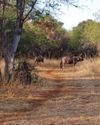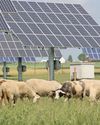
"To help save the planet, governments across the globe are choosing to adopt sustainable policies and encourage (or coerce) the private sector to do the same. Given the climate crisis, most responsible governments are focusing on finding every possible means to meet existing needs without sacrificing the planet to meet the needs of future generations.
In South Africa things are different. Although the country has presented guidelines for a just transition to greener energies, this has not been out of choice, but out of necessity. It is mainly due to the collapse of the country’s energy infrastructure, not government leadership or a change of mind among the coal lobby.
State-owned enterprises, specifically in electricity, rail and ports, are a legacy of the apartheid state and South Africa’s post-apartheid settlement. Being state-owned isn’t a problem, as long as an enterprise is run well. But in South Africa the government has failed to run them well. And failure in these areas has resulted in a turn to the private sector – either to help fix electricity, rail and the ports, or to fill the vacuum in other ways.
Even where government has adopted sustainable policies, the private sector has become the major driver of this shift, further worsening inequality.
The problem with greater private sector involvement is the sector’s profit motive. Not only are private sector-driven solutions only for those who can pay, they also end up driving public priorities. Thus, those who can pay also drive ‘development’, instead of government deciding in the interests of society as a whole (now and in the future). This is the reverse of how things should be.
Denne historien er fra June 21, 2024-utgaven av Farmer's Weekly.
Start din 7-dagers gratis prøveperiode på Magzter GOLD for å få tilgang til tusenvis av utvalgte premiumhistorier og 9000+ magasiner og aviser.
Allerede abonnent ? Logg på
Denne historien er fra June 21, 2024-utgaven av Farmer's Weekly.
Start din 7-dagers gratis prøveperiode på Magzter GOLD for å få tilgang til tusenvis av utvalgte premiumhistorier og 9000+ magasiner og aviser.
Allerede abonnent? Logg på

When short-term rentals make sense
Bianca Smit, national operations manager at CFAO Equipment SA, outlines factors to consider when choosing a rental equipment partner.

The timing of onion sowing is critical
Each onion variety has a different resistance to bolting, thus growers need experience and knowledge to guide them,

Understanding cannabis and hemp regulations in South Africa
South Africa's cannabis and hemp regulations remain a topic of debate and uncertainty, particularly when it comes to commercial use and small-scale production. Cannabis experts Shaad Vayej and Trenton Birch spoke to Octavia Avesca Spandiel about the challenges that small-scale cannabis and hemp farmers face.

European seed's influence on the US cannabis market
The expansion of European cannabis seed onto the US market is not just about economic growth; it’s also about enriching the landscape of US cannabis with diversity, innovation and education,

'It's important to get the right tool for the job'
The adoption of technology is crucial to sustaining efficiency gains and beating the cost-price squeeze in the agriculture sector.

A brilliant bushveld break between Bela-Bela and Modimolle
The distinctive touch, diligence, and 24/7 customer care are just a few of the reasons you should visit four-star Tourism Council-graded Pumula Game Farm,

John Deere: elevating performance and efficiency in modern farming
In the fast-paced world of farming, the right tools make all the difference.

The naval disaster Winston Churchill tried to hide
Three British warships were sunk by German naval gunfire on a dark day early in World War II, but the heroes who fought back received only muted recognition, possibly to avoid bad publicity,

Breaking down the principles of regenerative farming
Jean Hugo, a post-graduate student at the Tshwane University of Technology, and Leon Hugo, author on environmental matters and former professor of geography at the University of Pretoria, write about the importance of regenerative agriculture for small-scale farmers, and the challenges related to making the shift.

Ectoparasite control: more tips for livestock farmers
To reduce the mayhem that uncontrolled ectoparasites can create for communal farmers, it’s best to adopt a holistic approach in conjunction with veterinary remedies,